Module 11 Way of life Unit 3 Language in use 课件40张PPT
文档属性
| 名称 | Module 11 Way of life Unit 3 Language in use 课件40张PPT | 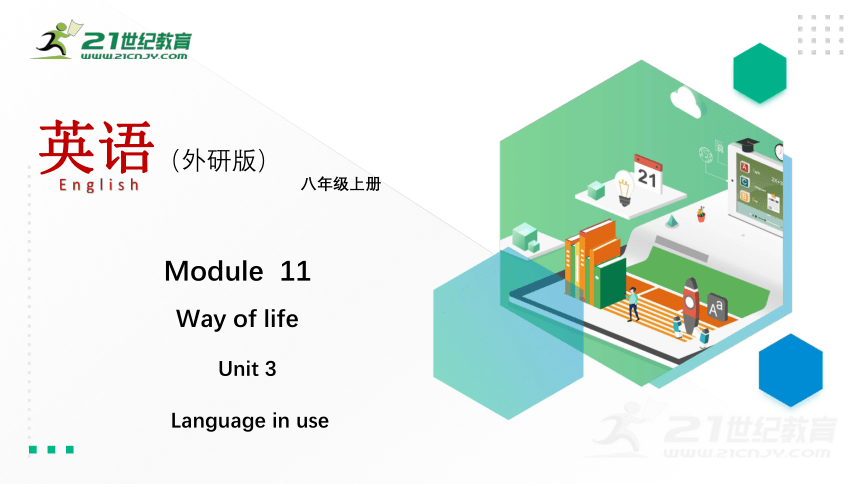 | |
| 格式 | pptx | ||
| 文件大小 | 9.6MB | ||
| 资源类型 | 试卷 | ||
| 版本资源 | 外研版 | ||
| 科目 | 英语 | ||
| 更新时间 | 2021-08-15 07:07:27 | ||
图片预览

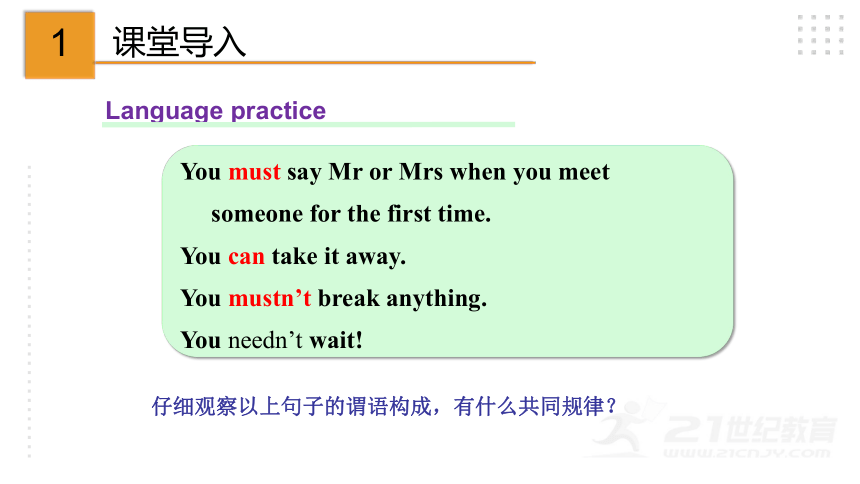

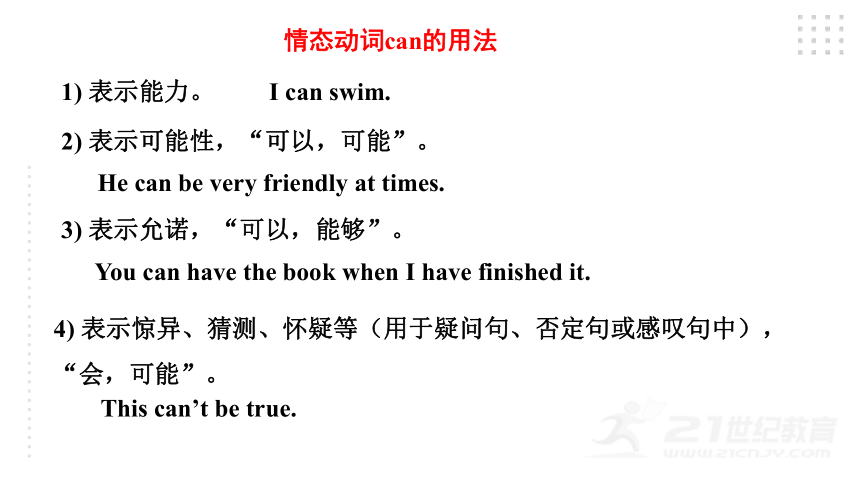

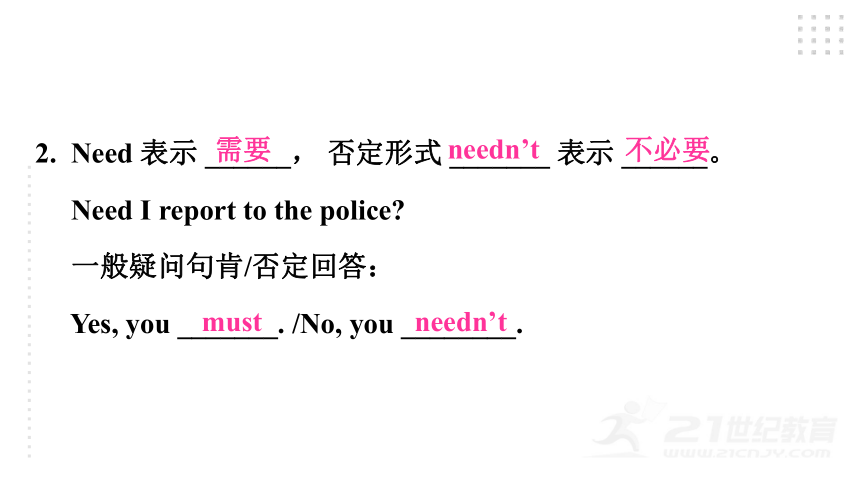
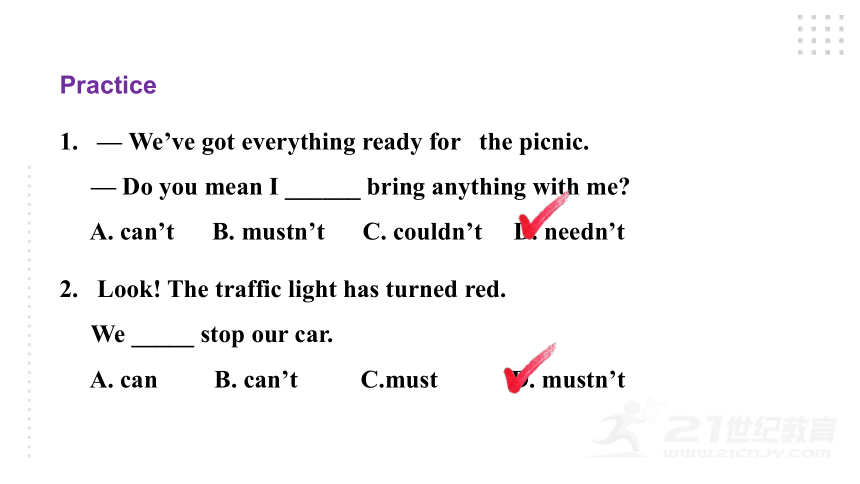

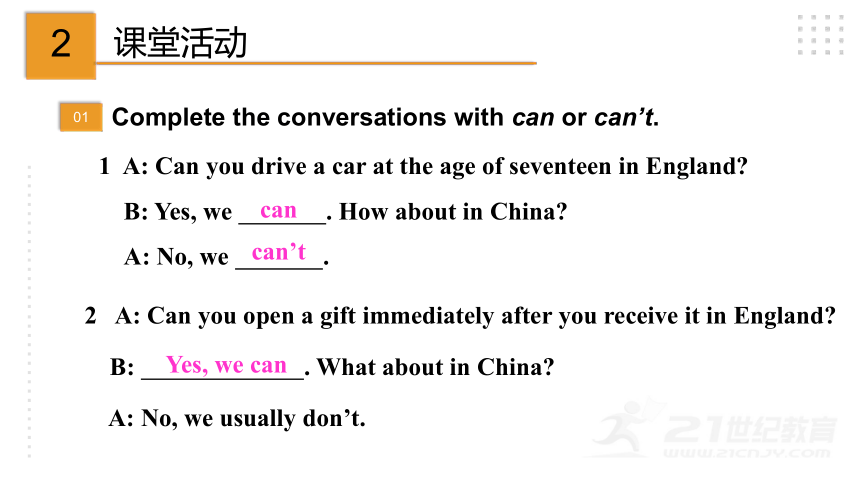
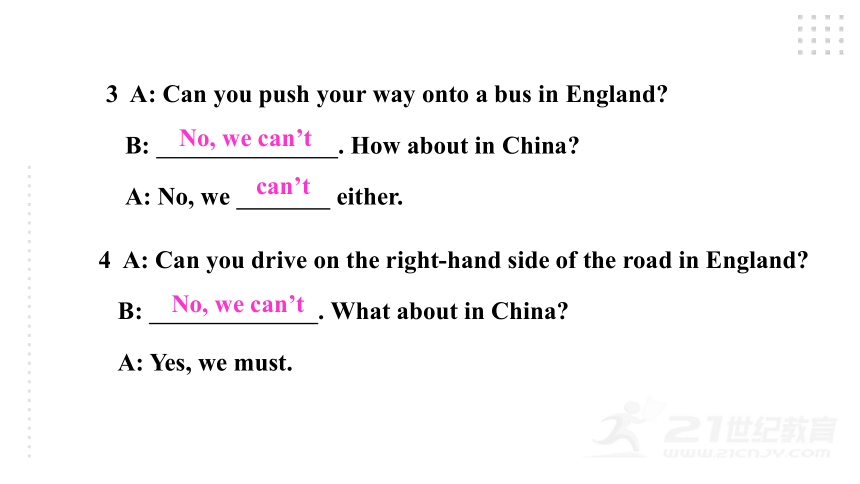
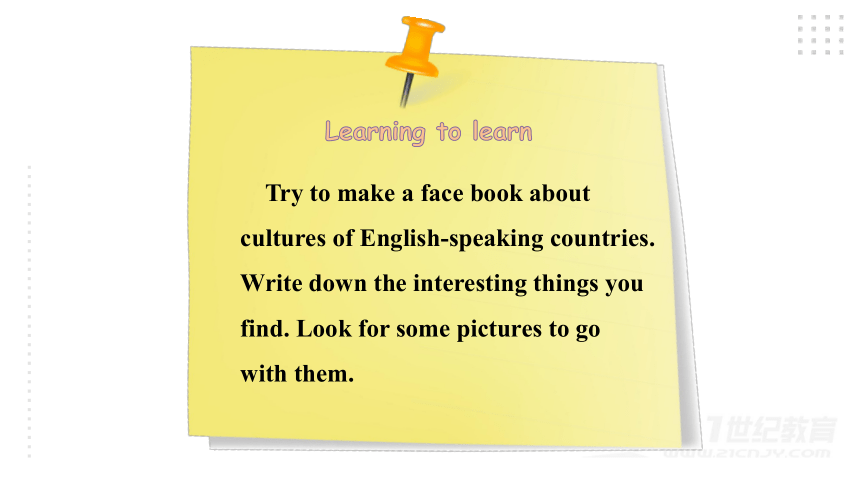
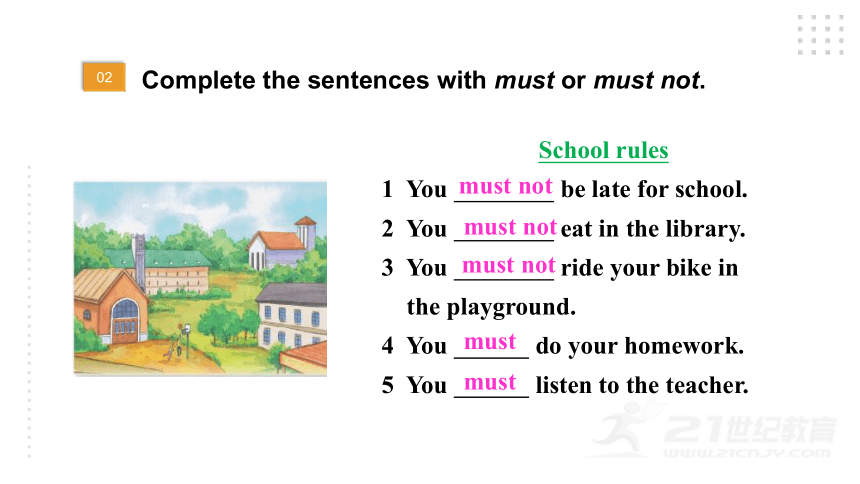
文档简介
英语(外研版)
八年级上册
English
Module 11
Way of life
Unit 3
Language in use
Language practice
You must say Mr or Mrs when you meet
someone for the first time.
You can take it away.
You mustn’t break anything.
You needn’t wait!
仔细观察以上句子的谓语构成,有什么共同规律?
1
课堂导入
情态动词must的用法
表示主观的义务和必要,主要用于肯定句和疑问句,为“必须得……要……”;由must引导的疑问句,肯定回答要用must,否定回答要用needn’t, “不必”; must的否定形式mustn’t表示禁止,“不能,不许”。
情态动词can的用法
1) 表示能力。
I can swim.
2) 表示可能性,“可以,可能”。
He can be very friendly at times.
3) 表示允诺,“可以,能够”。
You can have the book when I have finished it.
4) 表示惊异、猜测、怀疑等(用于疑问句、否定句或感叹句中),“会,可能”。
This can’t be true.
情态动词must、need
Summary
1. Must 表示 ______, 否定形式 _______ 表示 ______。
Must I come before 6:30 tomorrow?
一般疑问句肯/否定回答:
Yes, you _______. /No, you ________.
必须
mustn’t
禁止
must
needn’t
2. Need 表示 ______, 否定形式 _______ 表示 ______。
Need I report to the police?
一般疑问句肯/否定回答:
Yes, you _______. /No, you ________.
需要
needn’t
不必要
must
needn’t
Practice
1. — We’ve got everything ready for the picnic.
— Do you mean I ______ bring anything with me?
A. can’t B. mustn’t C. couldn’t D. needn’t
2. Look! The traffic light has turned red.
We _____ stop our car.
A. can B. can’t C.must D. mustn’t
3.— Sorry, Mis Liu. I left my workbook at home. Must I hand it in today?
— No, you ______. You ______ bring it here tomorrow.
A. mustn’t; should B. can’t; must
C. mustn’t; may D. needn’t; can
Complete the conversations with can or can’t.
1 A: Can you drive a car at the age of seventeen in England?
B: Yes, we . How about in China?
A: No, we .
can
can’t
2 A: Can you open a gift immediately after you receive it in England?
B: . What about in China?
A: No, we usually don’t.
Yes, we can
2
课堂活动
01
3 A: Can you push your way onto a bus in England?
B: . How about in China?
A: No, we either.
No, we can’t
can’t
4 A: Can you drive on the right-hand side of the road in England?
B: . What about in China?
A: Yes, we must.
No, we can’t
Try to make a face book about cultures of English-speaking countries. Write down the interesting things you find. Look for some pictures to go with them.
Learning to learn
Complete the sentences with must or must not.
School rules
1 You be late for school.
2 You eat in the library.
3 You ride your bike in
the playground.
4 You do your homework.
5 You listen to the teacher.
must not
must not
must not
must
must
02
Underline the correct words.
It is important to know what you must and must not do when you meet people from a different country.
You (1) may / must not ask Westerners “How old are you?” because it is not polite. You (2) might / can know someone well, but you (3) must / need not ask “How much money do you make?” He (4) may / can never speak to you again!
03
In public places, you (5) must / can ask people before you take photos of them, and you (6) must not / might not eat or drink in shops or museums.
In some countries you (7) cannot / can go into someone’s house with your shoes on. You (8) need not / must not take them off. But in some other countries you (9) might / must not wear shoes in the house.
Listen to a teenager talking about his life. Check (√) the things he must or mustn’t do.
04
must
mustn’t
1 clean up bedroom once a week
2 wash up after dinner
3 stay out after 9 pm
4 do homework before going out
5 wash hands before dinner
6 play music loudly after 10 pm
√
√
√
√
√
√
Listen again. What two things does he say he can do?
1 ___________________________________
2 ________________________________________
He can go out with his friends at weekends.
He can play music loudly before ten o’clock at night.
05
Well, my parents are quite strict. I must clean up
my bedroom once a week and I must always wash up
after dinner. My parents are very strict about that.
I mustn’t stay out after nine o’clock at night, but I can go out with my friends at weekends. I must do my homework before I go out and I must wash my hands before dinner. I can play music, but I mustn’t
play it loudly after ten o’clock at night.
Tapescript
Write some things you can, must and must not do at home.
I can… I must… I must not…
Now work in pairs. Tell each other three things you must do at home and three things you mustn’t do. Are your home rules different or the same?
— I must visit my grandparents once a week.
I mustn’t stay up late in the evening.
— ...
06
Possible answers
1. I can watch TV when I come home from school.
2. I must help around the house, for example, do the washing up.
3. I must not go to bed late.
Complete the sentences with the words or expressions in the box.
baseball cap chess set chopsticks dictionary presents
1 Use your to look up any words you do not understand.
2 Most Chinese people eat noodles with_____________.
dictionary
chopsticks
3 Jenny could not wait to open her birthday __________.
4 He thinks it is cool to wear his _____________back-to-front.
5 Where is my____________? Let’s play a game.
presents
baseball cap
chess set
07
Play a game. Choose a word or an expression from the box and describe it to the class. The class guesses what it is.
baseball cap bike chess set chocolate chopsticks dictionary fish and chips litter photo video game
A: Many people have one.
B: Is it a chess set?
A: No, You use it to get to places.
C: Is it a bike?
A: Yes.
08
You wear it on your head.
A baseball cap.
You can use it to look up new words.
A dictionary.
You can use it to play chess.
A chess set.
…
Traditional presents
In the West, people often take flowers when they visit someone. Different flowers have different meanings. For example, people often give red roses to someone they love. In Greece, you must not give white flowers because that means that someone is dead.
When you go to a foreign country, it is always best to check what people usually do, so you do not make mistakes.
Module task: Giving advice to foreign guests
who are visiting a Chinese family
Write some advice for foreign visitors to a Chinese family. Think about:
What must they wear?
What mustn’t they talk about?
What can’t they do?
What presents can they bring?
When must they arrive?
…
09
1. What must they wear?
A. Pajamas.(睡衣)
B. Formal clothes.
C. Slippers.(拖鞋)
2. What mustn’t they talk about?
A. weather
B. dead people
C. travelling
3. What can’t they do?
A. Shout at others.
B. Make a lot of noise.
C. Stay too long.
4. What presents can they bring?
A. Fruits.
B. White flowers.
C. Red wine.
5. When must they arrive?
A. Too early.
B. On time.
C. Too late.
6. What else need they do?
They need ____________.
Work in pairs. Show the advice you wrote in Activity 9 to your group members. Choose two best pieces of advice.
Show the advice your group chose in Activity
10 to the whole class. Put the pieces of advice together to form the advice of the whole class.
10
11
When you visit a Chinese family, you must wear formal clothes. You should bring some gifts.
You can bring fruits and red wine.
You must arrive on time.
Possible answers
Send the advice of the whole class to your foreign friends or post it on your class blog.
Advice for foreign guests
Welcome to China!
I’d like to give you some advice, when you visit a
Chinese family._____________________________
__________________________________________
__________________________________________
__________________________________________
Have a good time!
12
When in China, do as Chinese do.
入乡随俗。
3
课堂小结
1. We have learned to describe customs ; saying what you must do and mustn’t do.
2. We have learned to how to use “must mustn’t can can’t need and needn’t.”
3. We have learned to give some advice.
https://www.21cnjy.com/help/help_extract.php
八年级上册
English
Module 11
Way of life
Unit 3
Language in use
Language practice
You must say Mr or Mrs when you meet
someone for the first time.
You can take it away.
You mustn’t break anything.
You needn’t wait!
仔细观察以上句子的谓语构成,有什么共同规律?
1
课堂导入
情态动词must的用法
表示主观的义务和必要,主要用于肯定句和疑问句,为“必须得……要……”;由must引导的疑问句,肯定回答要用must,否定回答要用needn’t, “不必”; must的否定形式mustn’t表示禁止,“不能,不许”。
情态动词can的用法
1) 表示能力。
I can swim.
2) 表示可能性,“可以,可能”。
He can be very friendly at times.
3) 表示允诺,“可以,能够”。
You can have the book when I have finished it.
4) 表示惊异、猜测、怀疑等(用于疑问句、否定句或感叹句中),“会,可能”。
This can’t be true.
情态动词must、need
Summary
1. Must 表示 ______, 否定形式 _______ 表示 ______。
Must I come before 6:30 tomorrow?
一般疑问句肯/否定回答:
Yes, you _______. /No, you ________.
必须
mustn’t
禁止
must
needn’t
2. Need 表示 ______, 否定形式 _______ 表示 ______。
Need I report to the police?
一般疑问句肯/否定回答:
Yes, you _______. /No, you ________.
需要
needn’t
不必要
must
needn’t
Practice
1. — We’ve got everything ready for the picnic.
— Do you mean I ______ bring anything with me?
A. can’t B. mustn’t C. couldn’t D. needn’t
2. Look! The traffic light has turned red.
We _____ stop our car.
A. can B. can’t C.must D. mustn’t
3.— Sorry, Mis Liu. I left my workbook at home. Must I hand it in today?
— No, you ______. You ______ bring it here tomorrow.
A. mustn’t; should B. can’t; must
C. mustn’t; may D. needn’t; can
Complete the conversations with can or can’t.
1 A: Can you drive a car at the age of seventeen in England?
B: Yes, we . How about in China?
A: No, we .
can
can’t
2 A: Can you open a gift immediately after you receive it in England?
B: . What about in China?
A: No, we usually don’t.
Yes, we can
2
课堂活动
01
3 A: Can you push your way onto a bus in England?
B: . How about in China?
A: No, we either.
No, we can’t
can’t
4 A: Can you drive on the right-hand side of the road in England?
B: . What about in China?
A: Yes, we must.
No, we can’t
Try to make a face book about cultures of English-speaking countries. Write down the interesting things you find. Look for some pictures to go with them.
Learning to learn
Complete the sentences with must or must not.
School rules
1 You be late for school.
2 You eat in the library.
3 You ride your bike in
the playground.
4 You do your homework.
5 You listen to the teacher.
must not
must not
must not
must
must
02
Underline the correct words.
It is important to know what you must and must not do when you meet people from a different country.
You (1) may / must not ask Westerners “How old are you?” because it is not polite. You (2) might / can know someone well, but you (3) must / need not ask “How much money do you make?” He (4) may / can never speak to you again!
03
In public places, you (5) must / can ask people before you take photos of them, and you (6) must not / might not eat or drink in shops or museums.
In some countries you (7) cannot / can go into someone’s house with your shoes on. You (8) need not / must not take them off. But in some other countries you (9) might / must not wear shoes in the house.
Listen to a teenager talking about his life. Check (√) the things he must or mustn’t do.
04
must
mustn’t
1 clean up bedroom once a week
2 wash up after dinner
3 stay out after 9 pm
4 do homework before going out
5 wash hands before dinner
6 play music loudly after 10 pm
√
√
√
√
√
√
Listen again. What two things does he say he can do?
1 ___________________________________
2 ________________________________________
He can go out with his friends at weekends.
He can play music loudly before ten o’clock at night.
05
Well, my parents are quite strict. I must clean up
my bedroom once a week and I must always wash up
after dinner. My parents are very strict about that.
I mustn’t stay out after nine o’clock at night, but I can go out with my friends at weekends. I must do my homework before I go out and I must wash my hands before dinner. I can play music, but I mustn’t
play it loudly after ten o’clock at night.
Tapescript
Write some things you can, must and must not do at home.
I can… I must… I must not…
Now work in pairs. Tell each other three things you must do at home and three things you mustn’t do. Are your home rules different or the same?
— I must visit my grandparents once a week.
I mustn’t stay up late in the evening.
— ...
06
Possible answers
1. I can watch TV when I come home from school.
2. I must help around the house, for example, do the washing up.
3. I must not go to bed late.
Complete the sentences with the words or expressions in the box.
baseball cap chess set chopsticks dictionary presents
1 Use your to look up any words you do not understand.
2 Most Chinese people eat noodles with_____________.
dictionary
chopsticks
3 Jenny could not wait to open her birthday __________.
4 He thinks it is cool to wear his _____________back-to-front.
5 Where is my____________? Let’s play a game.
presents
baseball cap
chess set
07
Play a game. Choose a word or an expression from the box and describe it to the class. The class guesses what it is.
baseball cap bike chess set chocolate chopsticks dictionary fish and chips litter photo video game
A: Many people have one.
B: Is it a chess set?
A: No, You use it to get to places.
C: Is it a bike?
A: Yes.
08
You wear it on your head.
A baseball cap.
You can use it to look up new words.
A dictionary.
You can use it to play chess.
A chess set.
…
Traditional presents
In the West, people often take flowers when they visit someone. Different flowers have different meanings. For example, people often give red roses to someone they love. In Greece, you must not give white flowers because that means that someone is dead.
When you go to a foreign country, it is always best to check what people usually do, so you do not make mistakes.
Module task: Giving advice to foreign guests
who are visiting a Chinese family
Write some advice for foreign visitors to a Chinese family. Think about:
What must they wear?
What mustn’t they talk about?
What can’t they do?
What presents can they bring?
When must they arrive?
…
09
1. What must they wear?
A. Pajamas.(睡衣)
B. Formal clothes.
C. Slippers.(拖鞋)
2. What mustn’t they talk about?
A. weather
B. dead people
C. travelling
3. What can’t they do?
A. Shout at others.
B. Make a lot of noise.
C. Stay too long.
4. What presents can they bring?
A. Fruits.
B. White flowers.
C. Red wine.
5. When must they arrive?
A. Too early.
B. On time.
C. Too late.
6. What else need they do?
They need ____________.
Work in pairs. Show the advice you wrote in Activity 9 to your group members. Choose two best pieces of advice.
Show the advice your group chose in Activity
10 to the whole class. Put the pieces of advice together to form the advice of the whole class.
10
11
When you visit a Chinese family, you must wear formal clothes. You should bring some gifts.
You can bring fruits and red wine.
You must arrive on time.
Possible answers
Send the advice of the whole class to your foreign friends or post it on your class blog.
Advice for foreign guests
Welcome to China!
I’d like to give you some advice, when you visit a
Chinese family._____________________________
__________________________________________
__________________________________________
__________________________________________
Have a good time!
12
When in China, do as Chinese do.
入乡随俗。
3
课堂小结
1. We have learned to describe customs ; saying what you must do and mustn’t do.
2. We have learned to how to use “must mustn’t can can’t need and needn’t.”
3. We have learned to give some advice.
https://www.21cnjy.com/help/help_extract.php
同课章节目录
- Module 1 How to learn English
- Unit 1 Let's try to speak English as much as possi
- Unit 2 You should smile at her.
- Unit 3 Language in use .
- Module 2 My home town and my country
- Unit 1 It's taller than many other buildings.
- Unit 2 Cambridge is a beautiful city in the east o
- Unit 3 Language in use .
- Module 3 Sports.
- Unit 1 Nothing is more exciting than playing tenni
- Unit 2 This year we training more carefully.
- Unit 3 Language in use .
- Module 4 Planes, ships and trains .
- Unit 1 He lives the farthest from school.
- Unit 2 What is the best way to travel.
- Unit 3 Language in use .
- Module 5 Lao She Teahouse.
- Unit 1 I wanted to see the Beijing Opera.
- Unit 2 It descibes the changes in Chinese society.
- Unit 3 Language in use .
- Module 6 Animals in danger.
- Unit 1 It allows people to get closer to them .
- Unit 2 The WWF is working hard to save them all.
- Unit 3 Language in use .
- Revision module A
- Module 7 A famous story
- Unit 1 Alice was sitting with her sister by the ri
- Unit 2 She was thinking about her cat.
- Unit 3 Language in use .
- Module 8 Accidents
- Unit 1 While the car were changing to red, a car s
- Unit 2 I was trying to pick it up when it bite me
- Unit 3 Language in use .
- Module 9 Population
- Unit 1 The population of China is about 1.37 billi
- Unit 2 Arnwick was a city with 200,000 people.
- Unit 3 Language in use .
- Module 10 The weathe
- Unit 1 It might snow.
- Unit 2 The weather is fine all year round.
- Unit 3 Language in use .
- Module 11 Way of life
- Unit 1 In China ,we open a gift later.
- Unit 2 In England, you usually drink tea with milk
- Unit 3 Language in use .
- Module 12 Help
- Unit 1 What should we do before help arrives?
- Unit 2 Stay away from windows and heavy furniture.
- Unit 3 Language in use .
- Revision module B
